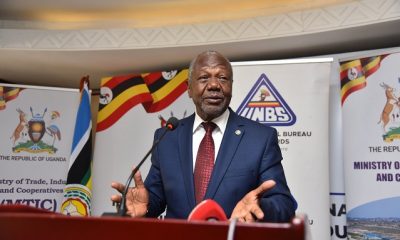Analysis
Youths; Unthankful or economically excluded?
The government of Uganda has taken a hard-line stance against concerns of young people by promising to crash anyone who dares to use protest as a means to express their opposition to its policies and its reluctance to leave power albeit.
This comes in the wake of the vicious attacks by soldiers attached to the President’s Special Forces Command on Members of Parliament and other opposition politicians in Arua last month, which has greatly soiled the government’s reputation locally and the country’s image internationally.
Although the Public Order Management Act 2013 greatly curtailed the fundamental civil liberty of freedom of expression, and peaceful demonstration, the latest raft of threats and warnings from the top security brass point to growing tensions between the government and the largest demographic group – the youth.
The government has escalated its rhetoric against the youth from categorising them as unthankful to labelling them as terrorists and hooligans who want to destabilise Uganda’s peace.
While responding to the Speaker of Parliament Rebecca Kadaga over her concerns surrounding the torture of Members of Parliament in Arua, President Museveni is quoted by Daily Monitor as having branded Opposition politicians as terrorists and hooligans.
His Minister for Security General Elly Tumwine also used unkind words for the young people whom he described as opportunists who merely want to destabilise the peace of Uganda.
Tumwine hinted at the government’s readiness to use all means at its disposal to crash any uprising by the young people.
He fell short of banning the wearing of red garments when he said that the Red movement, has brought chaos and many political upheavals in many countries including China, South Africa and Egypt.
While addressing the media at the Prime Minister’s Office in Kampala on Tuesday, Tumwine warned that they are ready to take the path taken by China and Egypt while handling political revolts some years ago.
The infamous 1989 Tiananmen Square protests in China, are the most deadly political uprising in recent history that are estimated to have ended with the death of an estimated 10,000 students.
The Tiananmen protests were forcibly suppressed by the Chinese army after their Premier then Li Peng declared martial law and fired live bullets on unarmed people.
The government narrative is that the youth are wrongly blaming the ruling party for failing to create jobs and a source of livelihood which has led to their frustration and anger.
But nearly all independent economists agree that Uganda’s economy has marginalised millions of Ugandan youth by failing to create gainful employment for them.
Prof. Julius Kiiza, a lecturer of Political Economy at Makerere University argued last year that it’s time to have new actors because the current set of economic actors has failed to deliver on their promise of transforming Uganda’s economy.
“I want to argue that for us to overcome the strategic stalemate [we are in], we have to think business unusual. Politics is central to the way we allocate and misallocate resources. The fundamental challenge we face as a country is this: Is it possible to have new thinking with old thinkers,” asked Kiiza.
Dr. Fred Muhumuza, another prominent economist has also dismissed the government’s narrative of runaway successes as illustrated in many reports such as many previous budget reports and World Bank reports that paint Uganda as a success story.
“The numbers fail when they talk about aggregates and don’t talk about the people,” Muhumuza said of the rosy economic reports, adding that the restrictive monetary policy approach pursued by the government has only made people poorer than richer, in an effort to control inflation.
“Uganda has been using the approach of taking away money from the people to control inflation, hence creating poverty; Restrictive monetary policy,” said Muhumuza.
In his widely acclaimed report on jobless growth, The Sunrise’s Ramathan Ggoobi, who also lectures Ugandan Economy at Makerere University Business School (MUBS), argued that Uganda’s development has remained jobless and therefore excluded majority of Ugandans because it largely put emphasis on the services sector as opposed to developing the agricultural sector that employs majority of Ugandans.
Ggoobi has warned the government to work on the concerns of the youth, lest they will become an even bigger threat as they grow older and more desperate. In the same breath, he has also warned the youth to stop provocative habits which may lead to their getting entangled into violence which may result into their death.
Comments



























